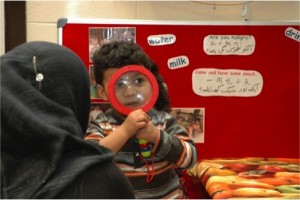 We all know that findings from early childhood studies and neuroscience have shown that children’s early experiences are important in affecting health, behaviour and developmental outcomes.
We all know that findings from early childhood studies and neuroscience have shown that children’s early experiences are important in affecting health, behaviour and developmental outcomes.
In their first three years, children develop physically, cognitively and emotionally at a faster rate than at any other time in their lives. All professionals need to respond to this by supporting children as they learn to walk and run, speak and communicate, relate to others, play, and explore their world.
As a foundation years professional you need to provide the children in your setting with the balance of child-initiated play, focused and structured learning to ensure that they enjoy learning to read, write, use numbers, think mathematically, explore their world and make creations.
The principles and commitments of the Early Years Foundation Stage Framework are rooted in child development, effective pedagogy and learning and development.
Find out more… (click to open)
- Effective Provision of Pre-school Education (EPPE) – Department for Education (DfE) funded study examining the effectiveness of early education
- Early Years Transition and Special Educational Needs (EYTSEN) – a DfE funded study identifying children aged 3 at risk of developing special educational needs and tracking the effects of early education on outcomes at age 6. Find more information in Knowledge Hub / SEND
- Social and Emotional Aspects of Development – guidance for practitioners
- Feinstein L (2003) Inequality in early cognitive development of British children in the 1970 cohort, Economica 70: 73–97.
- University of London, Institute of Education – a national centre for education and social research and teacher training
- Centre for Excellence and Outcomes (C4EO), Papers and case studies – The Centre for Excellence and Outcomes in Children and Young People’s Services provides a range of products and support services for practitioners to improve outcomes
- TACTYC – Association for the Professional Development of Early Years Educators
- National Centre for Excellence in Teaching of Mathematics (NCETM) – signposts practitioners towards useful materials and continuing professional development opportunities. It also helps share best practice in mathematics teaching.
- Talk to Your Baby – from the National Literacy Trust, with information for parents and practitioners on improving literacy in the early years.
- When did you last take some time out to read or refer to a piece of research on child development to inform your practice?
- How do you use your knowledge of child development to work with children and families for whom English is not their first language?
